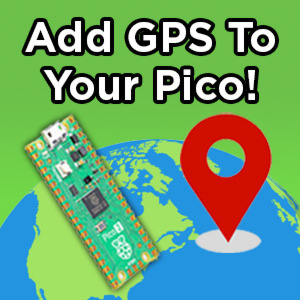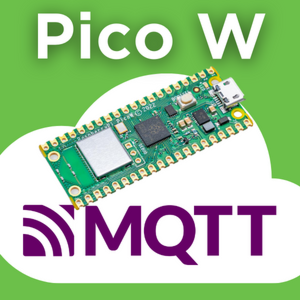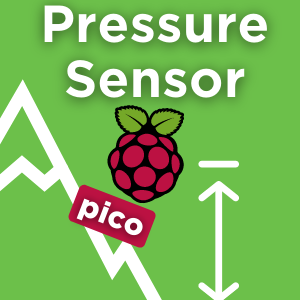Raspberry Pi Pico tutorials served straight up from the creative team at Core Electronics. We cover a range of uses from software through to hardware. We're here to help as well, technical support on our forum and sales support via 02 4058 2818
How to add mmWave Radar to a Pico | Detect and Track Humans
In this guide, we will be learning how to use the RD-03D radar sensor with a Raspberry Pi Pico so you can detect and track humans in your next project. We will be looking at how it operates and what you will get out of it, how to con...
How to Control a Water Pump with a Raspberry Pi Pico
In this guide, we will be learning how to control a pump with a Raspberry Pi Pico. Whether you are pumping coolant in a project, making a DIY water fountain, or building a self-watering plant project, this guide will gear you up with every...
How to add GPS to a Raspberry Pi Pico | Get Real-Time Location in Your Project!
In this guide, we will be learning how to use a GPS module with the Raspberry Pi Pico and MicroPython. We will be looking at; how GPS works, how to wire up and code the Pico to use the GPS module, and as a final step we will be putting it ...
Raspberry Pi Pico 2 | Overview, Features and Specs
Three and a half years after the launch of the original Pico, Raspberry Pi has announced a successor to their line of affordable microcontroller boards – the Raspberry Pi Pico 2. It sports the new RP2350 chip which houses a wealth of...
Getting Started with MQTT on Raspberry Pi Pico W - Connect to the Internet of Things!
IntroductionIn this guide, we'll get a Raspberry Pi Pico W to send and receive data to the cloud using the MQTT protocol. To follow along, all you'll need is: A Raspberry Pi Pico W Understand how to connect the Pico W to WiFi Underst...
Raspberry Pi Pico W | Connecting to the Internet
IntroductionIn this guide, we'll get a Raspberry Pi Pico W connected to the internet using WiFi. To demonstrate the connection we can query a webpage, or get the current time from a time service. To follow along, all you'll need is: A R...
Raspberry Pi Pico W | Create a Simple HTTP Server
In this guide we'll create a simple HTTP server using a Raspberry Pi Pico W. This server will be accessible from within a local WiFi network and can be used to read sensors and control hardware - in our case we'll drive an LED and read the...
Raspberry Pi Pico W | Overview, Features and Specs
IntroductionLet’s take a look at the Raspberry Pi Pico W - a WiFi-enabled development board from Raspberry Pi. This overview article will explore the Pico W features and specifications. As always, there are additional resources at th...
Raspberry Pi Pico W vs. Pico | What's the difference?
IntroductionThis article will compare the Raspberry Pi Pico, and Pico W. Aside from the obvious difference (the Pico W has wireless connectivity), there are a few smaller and more subtle differences that are worth considering.Physical Comp...
PiicoDev RFID Module - Guide for Raspberry Pi Pico
Radio Frequency IDentification (RFID) uses electromagnetic fields to identify and communicate with tags. Each RFID module emits radio waves that energise the passive tag, which then responds with its own identifying number or data, as reque...
PiicoDev Magnetometer QMC6310 - Guide for Raspberry Pi Pico
This guide is for the previous revision of the PiicoDev Magnetometer QMC6310 - if you have the latest revision featuring the MMC5603 - head to the guide for updated links and instructions.Let's get started with the PiicoDev® Magnetome...
Makerverse Real Time Clock with Supercapacitor Backup - Raspberry Pi Pico Guide
Introduction This guide covers the basic use of the Makerverse Supercap Real Time clock on the Raspberry Pi Pico using our RV3028 MicroPython module. The MicroPython module implements some commonly used features of the RV3028 RTC but is no...
Makerverse Micro SD Adapter - MicroPython Guide and Data Logging
Introduction This guide covers how to connect the Makerverse Micro SD Card Adapter to a Raspberry Pi Pico and program a basic data logging script in MicroPython. To follow along, it's best to have: A Makerverse Micr...
Makerverse Nano Power Timer
Introduction The Makerverse Nano Power Timer is an ultra-low current consumption power controller designed to periodically turn on a battery powered microcontroller. It is perfect for maximising the battery life of data-logging sensor...
Makerverse Motor Driver, 2 Channel - Application Guide
Introduction The Makerverse Motor Driver has been updated to a v20 design which now features a 5V output pin instead of the VM pin. Some images and in-video descriptions in this guide may be outdated This guide covers the use of the Make...
PiicoDev Buzzer Module - Guide for Raspberry Pi Pico
Introduction Let's play tones and melodies on a PiicoDev® Buzzer Module with a Raspberry Pi Pico. This guide will cover connecting the hardware, running an example to make sure everything works, and playing simple melodies. To follow ...
PiicoDev RGB LED Module - Raspberry Pi Pico Guide
Let's get started with the PiicoDev® 3x RGB LED Module. In this guide, we'll connect the LED Module to our Raspberry Pi Pico and get it working with some example code to display colourful patterns. To follow along, it's best to ...
PiicoDev Colour Sensor VEML6040 - Raspberry Pi Pico Guide
Introduction Let's read colour data from a PiicoDev® Colour Sensor with a Raspberry Pi Pico, and create a colour sorting machine. This guide will cover connecting the hardware, downloading some example code and remixing it. ...
PiicoDev OLED Module SSD1306 - Raspberry Pi Pico Guide
Let's get started with the PiicoDev® OLED Module SSD1306. In this guide, we'll connect the PiicoDev OLED to our Raspberry Pi Pico and get it working with some example code to display text, shapes, and animations. To ...
PiicoDev Pressure Sensor MS5637 - Raspberry Pi Pico Guide
Introduction This guide will help you read barometric pressure from your PiicoDev® Pressure Sensor and a Raspberry Pi Pico To follow along, it's best to have: A Raspberry Pi Pico with pins soldered (pointing down) A PiicoDev Press...
PiicoDev Distance Sensor VL53L1X - Raspberry Pi Pico Guide
Introduction This guide will help you read distance data in millimeters from your PiicoDev® Distance Sensor and a Raspberry Pi Pico To follow along, it's best to have: A Raspberry Pi Pico with pins soldered (pointing down) A Piico...
PiicoDev Precision Temperature Sensor TMP117 - Raspberry Pi Pico Guide
Introduction This guide will help you read temperature data from your PiicoDev® Precision Temperature Sensor and a Raspberry Pi Pico To follow along, it's best to have: A Raspberry Pi Pico with pins sol...
PiicoDev Ambient Light Sensor VEML6030 - Raspberry Pi Pico Guide
Introduction This guide will help you read light intensity data from your PiicoDev® Ambient Light Sensor and a Raspberry Pi Pico To follow along, it's best to have: A Raspberry Pi Pico with pins soldered (pointing down) A PiicoDev...
PiicoDev Atmospheric Sensor BME280 - Raspberry Pi Pico Guide
Introduction This guide will help you read atmospheric data from your PiicoDev® Atmospheric Sensor and a Raspberry Pi Pico To follow along, it's best to have: A Raspberry Pi Pico with pins soldered (pointing do...
How to Setup a Raspberry Pi Pico and Code with Thonny
This guide will help you get started with the Raspberry Pi Pico and the Thonny Python IDE, which has out-of-the-box support for Micropython and Pico. #html-body [data-pb-style=DGOAWEQ],#html-body [data-pb-style=PBBP9DB]{background-position...
How to use WS2812B RGB LEDs with Raspberry Pi Pico
In this tutorial, we'll get some WS2812B LEDs (also known as GlowBits and NeoPixels) working with a Raspberry Pi Pico. If you haven't already set up Thonny for programming your Pico, follow our guide on that first. To follow along you'll...
Getting Started with Raspberry Pi Pico
This guide is a little outdated: Follow our updated guide for a much simpler way to get started! Contents Part 1 - Interacting Coding with the REPL Part 2 - Moving Beyond the REPL (with rshell) Part 1 - Interactive Coding with the...
Makers love reviews as much as you do, please follow this link to review the products you have purchased.





























